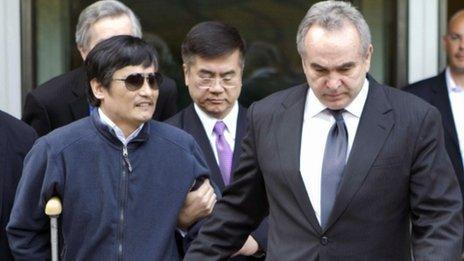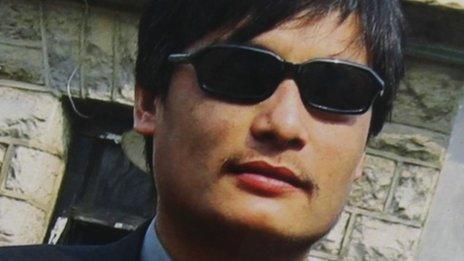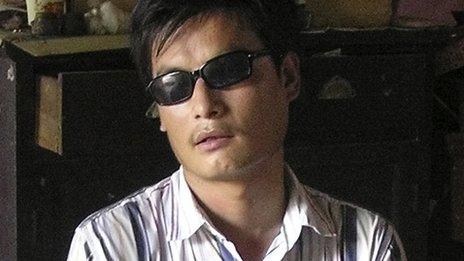High stakes for Obama and Chen Guangcheng
- Published
- comments

Chen Guangcheng (left) was led out of the US Embassy by Assistant Secretary of State Kurt Campbell (right) and US Ambassador Gary Locke (centre)
The fate of Chinese dissident Chen Guangcheng is not yet clear. But that won't stop many from judging that this muddle is of US President Barack Obama's making.
The Obama administration looks like it has been caught on the hop and the embassy is being portrayed by many as either fools or knaves.
Republican presidential candidate Mitt Romney says, external it is a dark day for freedom and a day of shame for the Obama administration.
In some of his numerous telephone interviews, Mr Chen suggests that he feels let down by America, external. Although he did not say that talking to the BBC.
Elsewhere, he has suggested that he was pretty much forced to leave to save the US embarrassment as important talks get underway.
President Obama's spokesman says it is "not the case" that Mr Chen has been abandoned, adding that talks were still going on with him, his family, and the Chinese government.
High stakes
The confusion has arisen because Mr Chen has changed his mind about staying in China, although that is not the central problem.
He changed his mind because he took the threat to send his family home as a death sentence, whereas the embassy seems to have missed this interpretation.
The US ambassador to China, Gary Locke, says he spent five hours a day, external he spent five hours a day with Mr Chen and at that no point did he ask for asylum.
"He made it very, very clear from the very, very beginning that he wanted to stay in China, that he wanted to be part of the struggle to improve the human rights within China, and to gain greater liberty and democracy for the people of China.
"We asked him, did you want to go to the United States, and he said no," Mr Locke told reporters.
He says that Mr Chen rejected one deal but then accepted another.
"And then we asked him what did he want to do, did he want to leave, was he ready to leave. And we waited several minutes and then suddenly he jumped up, very excited, very eager, and said, 'Let's go,' in front of many, many witnesses.
"We then proceeded to take him down to the van with the doctors, translators, and many other personnel. Before he went into the van, I asked him again: 'Is this what you want to do? Are you ready to leave the embassy?' And he said yes."
But the heart of the affair remains the same.
What still strikes me is the promise, made by Secretary of State Hillary Clinton, that the US would act as guarantors that the Chinese would keep their promises to allow Mr Chen liberty and freedom to study law.
"The United States government and the American people are committed to remaining engaged with Mr Chen and his family in the days, weeks, and years ahead," Mrs Clinton said.
When she first said this it looked bold, but now it seems reckless.
Some critics of the administration are portraying the embassy, external as inept bunglers under pressure to remove a distraction before the big talks got under way.
Others claim that others that President Obama has been cold-blooded, external and ruthless.
Until we know the outcome it is not wise to rush to judgment. But President Obama is playing for high stakes, at home and abroad.
- Published3 May 2012

- Published2 May 2012
